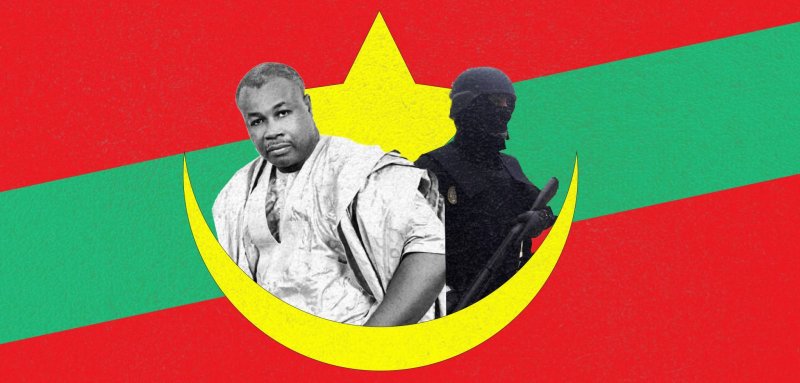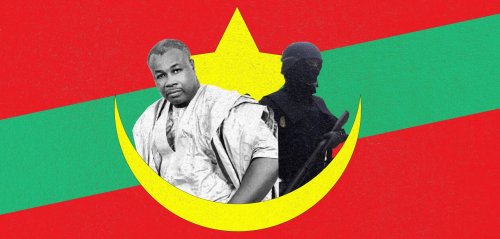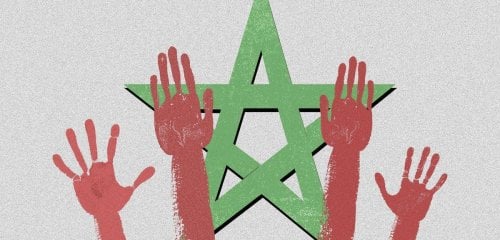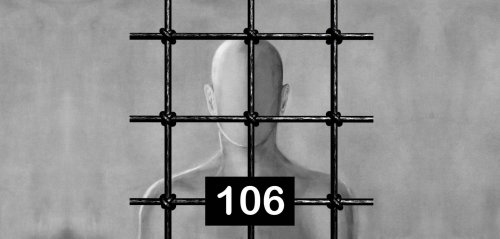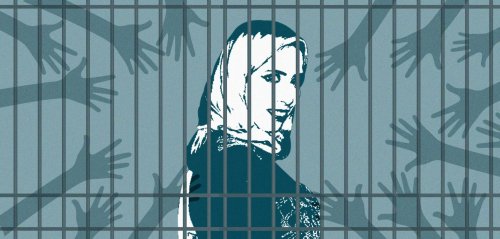Thousands of Mauritanians gathered at the Ibn Abbas Mosque in Mauritania’s capital, Nouakchott, on Tuesday, February 14, 2023, for funeral prayers for the Mauritanian human rights activist al-Soufi Ould al-Chine, following days of anger, protests and controversy that came after he was killed inside a police station, an event that sparked anger among Mauritanians and triggered demands for justice for the victim.
Those who enter the police station go missing!
Mauritanian police on Thursday (February 9th) took human rights activist al-Soufi Ould al-Chine to a police station in Dar Naim and, according to his relatives, died as a result of police violence.
Youth activist Abdelbaqi al-Arabi spoke to Raseef22 about why he attended Ould al-Chine's funeral, saying, "Unfortunately, I did not have the privilege of getting to know al-Soufi Ould al-Chine up close, but everything I heard about him after his death prompted me to try to look into his honorable human rights past. After I searched, I found his activity on social media, and my attention was drawn to the man’s kindness, and his constant attempts to maintain the cohesion of this society, and to cultivate a culture of tolerance among its members. This, among other things, made me attend his funeral, and to also of course declare my full solidarity with him and his family until this injustice is lifted from them and justice is achieved."
When the death of al-Soufi Ould al-Chine was announced, the Mauritanian General Directorate of National Security published a press release saying that he had died as a result of a sudden health problem during his detainment in the station, after which he was transferred to Sheikh Zayed Hospital, where he breathed his last breath. This official version quickly caused great controversy, with the victim's family refusing to receive his body before an autopsy, accompanied by angry protests over the incident demanding justice for the victim and punishment for his "killers". In the midst of a general state of deliberation and anger, an autopsy was conducted on the victim's body by a specialized team and the team's medical report suggested that the death was caused by "traumatic asphyxiation by strangulation".
The killing of activist al-Soufi Ould al-Chine inside a police station in Mauritania sparked widespread public outrage, especially as there were attempts to cover up the case and present his death as an accident
The report's conclusions included signs of suffocation, "such as bloody discharge, foam in the nostrils of the nose and mouth, excessive cyanosis (blueness) in the face and under the nails. The report also confirmed the presence of fractures, bruises and contusions in the neck."
At a press conference held at the Mauritanian Ministry of Health, the head of the team that conducted the autopsy on the body, Dr. Enjay Mamdou, said that the report prepared by the team showed the presence of two fractures at the neck, stressing that this type of fracture usually occurs as a result of severe neck strangulation by hand.
A full-fledged crime?
The controversy over the cause of death was accompanied by a second controversy, which poses the questions: How did the al-Soufi get to the police station? And why? There was a lot of news and rumors on the matter, and news circulated that he had been lured to exact revenge against him over some of his positions and statements. Other news said that he had gone there as a result of a complaint by another citizen over a matter of debt. Meanwhile, Mauritanian media on Tuesday published a report sent by the concerned security commissioner to the regional director in the northern state of Nouakchott on February 10, in which he said that the complainant, Ould al-Chine, after reviewing the content of the complaint regarding a debt of 800 thousand MRU, responded positively and promised to compensate the amount later. The commissioner confirmed that the arrest aroused the anger of Ould al-Chin, who refused to enter the security detention room at the station, and this necessitated placing handcuffs on his hands for fear of escaping, adding that, "Shortly after, one of the officers noticed that he had collapsed and called the patrol to transfer him to Sheikh Zayed Hospital, where he was examined by the attending physician, who confirmed his death."
The Commissioner confirmed that the forensic doctor, after examining the person concerned, did not notice what would have been a cause of death to be brought by the Public Prosecutor to the family of the deceased, and informed them that the cause of death is 99.99% cardiac arrest.
According to preliminary information, Ould al-Chine was lured to a police station far from his home, and was subjected to torture that resulted in his death
However, this account was intended to mislead public opinion, as it later appeared that it was to cover up the real causes of death, as the official National Mechanism for the Prevention of Torture said that a team it had formed to investigate and research the circumstances of the arrest and detention of the victim Ould al-Chine, concluded that he was "subjected to torture and ill-treatment during his arrest."
Mauritanian activist Bab Ould Ibrahim spoke to Raseef22 about the course of the murder of the activist Ould al-Chine, saying, "The killing of human rights activist Ould al-Chine is a heinous crime committed by an apparatus that is supposed to provide protection and reassurance to any citizen. His killing and the attempt to cover up the crime has angered the Mauritanian street, which refused to let it be handled in the dark and dropped as if it is something normal. The case exposed major sectors that are considered to be the most important in the country, through their provocative handling of the killing of the late activist, namely the security, justice and health sectors, but the people rejected anything other than a serious path that clarifies the truth behind the murder, and leads to those who committed the heinous crime against him and their punishment."
“The killing of human rights activist Ould al-Chine is a heinous crime committed by an apparatus that is supposed to provide protection and reassurance to any citizen in the country”
The speaker also pointed out that "the legal violations accompanied the file from the beginning, as the victim was brought in by a police commission residing outside its jurisdiction, on the grounds that he was transferred from a public prosecutor who the victim resides outside the jurisdiction of his borders. After that, he was also arrested without the permission of the prosecutor, which is also an illegal procedure, ending with the heinous crime committed against him by killing him."
He added, "There was an uproar in the street that reflects the size of the wound left by the gruesome killing of a citizen by those who are supposed to guard and protect citizens, and the uproar was heightened by the attempt to cover up the crime, by issuing a death certificate in a short period of time, stating that the death occurred of natural causes, and then immediately obtaining permission from the prosecutor to bury him right away. The police also issued a statement containing an account aimed at covering up the crime, which angered all Mauritanians, and created a state of tension that had never been seen before. This prompted people to take to the streets and exert pressure to take a different path, which was done under pressure from the street."
According to Mauritanian activist Yaslam Mahmoud, who also spoke to Raseef22, "The way the file was handled was full of mistakes, and perhaps appeasing. This began with the fake medical report in which the doctor asserted that the death was caused by a heart attack, followed by a police statement that claimed that the man died due to an emergency health condition, but if it were not for the uproar that occurred and was led by family members, no one would have known what really happened. They refused to receive the body and insisted on performing a criminal forensic autopsy, and from here, activists in alternative media began to pay attention to what happened, and pressure began in the same direction, and then the authority intervened, and gave orders for a criminal investigation. All of this was in the right direction and the results that came exposed the lies of the police and the deceitful doctor who betrayed his oath of medicine, almost covering up a crime."
Similar cases and demands for justice
The killing of activist al-Soufi Ould al-Chine brought back memories of previous cases to Mauritanian activists, such as the murder of Naval Academy student Ahmed Mohamed Mahmoud Mohamed el-Mokhtar last October. Following controversy and protests, an investigation was opened into the case, which resulted in the Public Prosecution in the city of Nouadhibou, northern Mauritania, referring an officer accused of killing the student to the investigating judge on charges of "manslaughter". Another such case is that of al-Mashdoufi in the city of Akjoujt years ago, who died during labor protests, and was said at the time to have died as a result of being beaten by the guards, but the authorities said that his death was natural. The incident widely opened the door on the need to take care of the national police sector, combat corruption in it, and the establishment of a public security department for the state and not for political systems controlled by a mentality that depends on experienced individuals. Some called for the need to dismiss officials and have them resign after all that happened. Activist Bab Ould Ibrahim said, "Talking about the resignation or dismissal of officials in such circumstances is possible and has its merits, even if there is no legal responsibility, the normal procedure is to say that any official related to this crime may be dismissed and referred to investigation, and for those who lead the agencies to resign, if the crime was committed in their name, or they had participated in it by supervising or trying to cover up, which is a ethical matter at they very least, and is important for institutions, their image and the citizens' confidence in them."
The incident widely opened the door on the need to take care of the national police sector, combat corruption in it, and the establishment of a public security department for the state and not for political systems dependent on individuals
Ould Ibrahim spoke of a state of "real uproar in the street caused by this crime, which made citizens lose confidence in the country’s main institutions and agencies, and restoring confidence in them will require a lot of time if there is an approach to reform them in order to restore the confidence of citizens, even though reforming them has become an urgent matter, and can no longer stand postponement."
In turn, activist Yaslam Mahmoud said, "If we were in a truly democratic country, all the officials under whose authority the crime occurred would have resigned, this is more honorable for them and purer to the values of the republic, and resignation does not mean that the person committed a crime or made a mistake, but rather is for a clear conscience, as he could not control his subordinates."
He added, "I think the uproar will subside little by little, but before justice is achieved, things won't be comfortable. The steps are simple, which include bringing the perpetrators to justice for a fair trial that is not affected by the calls in the Mauritanian street, preceded by an investigation that reveals the identity of those involved in this crime, and how all this happened, and in order not let the matter be repeated, a court for the police must be established, and cameras must be installed inside stations and commissions, as well as inside the interrogation rooms."
The speaker concluded by saying that one of the most important messages that resulted from the case is that “alternative media activists and human rights bodies are not ready to overlook human rights issues, including also that Mauritanian youth have begun to unite around demands with a civil dimension away from tribalism, and I think that young people are beginning to understand that this will not offer them anything."
Raseef22 is a not for profit entity. Our focus is on quality journalism. Every contribution to the NasRaseef membership goes directly towards journalism production. We stand independent, not accepting corporate sponsorships, sponsored content or political funding.
Support our mission to keep Raseef22 available to all readers by clicking here!
Interested in writing with us? Check our pitch process here!
